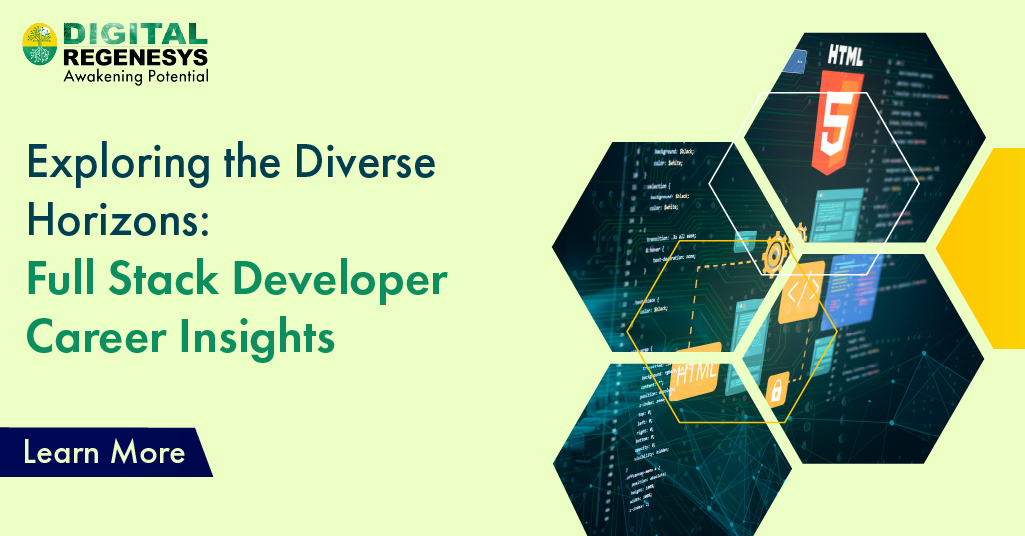Which career opportunities are available for a full stack developer?

In the fast-evolving landscape of technology, full stack developers have emerged as versatile professionals capable of handling both front-end and back-end development. Their skill set spans a wide range of technologies and languages, making them indispensable in today’s competitive job market.
This blog will delve into the various career opportunities available for full stack developers in the field of full stack web development, shedding light on the diverse roles and industries where their expertise is highly sought after.
Table Of Contents
- Web Development
- Mobile App Development
- Software Engineering
- Freelancing and Consulting
- Entrepreneurship
- Education and Training
- Specialised Roles
- Conclusion
Web Development
One common career path for full stack developers is web development. They boast the skills needed to make, update, and manage dynamic websites and web applications. Full stack developers are good at using languages like HTML, CSS, and JavaScript, as well as frameworks like React, Angular, or Vue.js, to create attractive user interfaces (UI). They also handle server-side tasks using technologies like Node.js, Django, or Flask.
Below are some more detailed areas within web development a full stack developer can go for.
- Front-End Development: Full stack developers proficient in front-end technologies like HTML, CSS, and JavaScript can pursue roles focused on creating visually appealing and user-friendly interfaces. They collaborate closely with designers to implement responsive designs that work seamlessly across different devices and browsers.
- Back-End Development: On the back-end, full stack developers leverage their knowledge of server-side languages and frameworks to build robust and scalable web applications. They work with technologies like Node.js, Django, Ruby on Rails, or ASP.NET to handle data storage, user authentication, and business logic. They also ensure the security and performance of web applications by implementing best practices and optimising code for efficiency.
- Content Management Systems (CMS): Full stack developers can specialise in working with popular CMS platforms like WordPress, Drupal, or Joomla. They customise and extend CMS functionalities to meet specific client requirements, ranging from simple websites to complex web applications. Their expertise in both front-end and back-end development enables them to create seamless and user-friendly content management experiences for clients.
- E-Commerce Development: For full stack developers, e-commerce is a valuable industry offering opportunities to create and manage online stores and shopping portals. They integrate secure payment gateways, manage product catalogues, and optimise checkout processes to enhance the shopping experience for users.
Mobile App Development
With the increasing use of smartphones and tablets, there has been a sharp increase in the demand for mobile applications in recent years.
Full stack developers with expertise in front-end frameworks like React Native or Flutter, along with back-end technologies, can venture into mobile app development. They can build cross-platform mobile applications that offer a seamless user experience across various devices and platforms. Their ability to work on both the client and server sides enables them to develop robust mobile apps with integrated functionalities.
Full stack developers can pursue a role in the mobile development field through the following sections:
- Native App Development
- Cross-Platform Development
- Progressive Web Apps (PWAs)
- Mobile Backend as a Service (MBaaS)
- Mobile Game Development
Software Engineering
Full stack developers possess a comprehensive understanding of software architecture, database management, and server-side scripting, making them valuable contributors to software engineering teams. They can collaborate with engineers and designers to conceptualise, develop, and deploy software solutions that meet the needs of businesses and end-users. Their versatility allows them to adapt to different project requirements and contribute to various stages of the software development lifecycle.
In software engineering roles, full stack developers are responsible for developing end-to-end solutions that meet business requirements while adhering to industry best practices. They participate in all phases of the software development lifecycle, from requirement gathering and design to implementation, testing, and maintenance.
In addition to traditional software engineering roles, full stack developers are increasingly in demand for specialised areas such as AI and machine learning, where they can apply their skills to develop intelligent applications and algorithms.
Overall, full stack developers bring a unique blend of technical skills, problem-solving abilities, and domain knowledge to software engineering roles. Their versatility, coupled with their deep understanding of the entire development stack, makes them valuable assets in building innovative software products that drive business success.
Freelancing and Consulting
In the full stack software development field, full stack developers have the flexibility to work as freelancers or consultants, offering their expertise to clients on a project basis. They can take on diverse projects, from website development and e-commerce platforms to custom software solutions. Freelancing allows full stack developers to explore different industries, work on challenging projects, and build a diverse portfolio while enjoying the freedom of managing their schedules and choosing their clients. They can also take up full stack development courses to gain more knowledge and learn about new trends to incorporate in their work.
Entrepreneurship
Many full stack developers choose to leverage their skills to launch their startups or tech ventures. With their ability to handle both front-end and back-end development tasks, they can create minimum viable products (MVPs) or full-fledged applications from scratch. Whether it’s developing a new web application, launching a mobile app startup, or venturing into software as a service (SaaS) offerings, full stack developers can bring their ideas to life and potentially disrupt industries with innovative solutions.
Education and Training
Experienced full stack developers can transition into roles in education and training, sharing their knowledge and expertise with aspiring developers. They can work as instructors in full stack development courses, coding boot camps, online learning platforms, or educational institutions, guiding students through the intricacies of full stack development. Additionally, they can contribute to curriculum development, create instructional resources, and mentor individuals looking to enter the field of web development.
Specialised Roles
Depending on their interests and level of experience, full stack developers might also specialise in particular areas of the tech industry. They can become experts in specific programming languages, frameworks, or technologies, such as blockchain development, artificial intelligence (AI), or cybersecurity. Full stack developers can develop unique career paths and establish themselves as leaders in the field by concentrating on specialist jobs in developing technology areas.

Conclusion
In conclusion, full stack developers have many career opportunities available to them across various industries and domains. Whether they choose to pursue traditional roles in web development and software engineering or explore emerging fields like freelancing, entrepreneurship, or education, full stack developers are well-equipped to thrive in today’s dynamic tech landscape. With their versatile skill set and adaptability, full stack developers play a vital role in driving innovation and shaping the future of technology.
If you want to know more about full stack development courses, check out Digital Regenesys’s Full Stack Web & Software Development online course, designed for tech enthusiasts like you, for anyone looking to make a transition in this field or working professionals who wish to upskill themselves.
FAQs – Frequently Asked Questions: Which career opportunities are available for a full stack developer?
Q.1 What is a full stack developer?
A.1A full stack developer is a multifaceted professional with expertise in front-end and back-end web application development. In simpler terms, they are skilled in building the entire “stack” or the layers of a web application, from the user interface that users interact with (front-end) to the server, database, and application logic that operate behind the scenes (back-end).
Q.2 What is Full Stack Software Development?
A.2 Full stack software development refers to the practice of developing both the front-end (client-side) and back-end (server-side) components of a software application. This comprehensive skill set enables full stack developers to create end-to-end solutions and tackle various challenges throughout the software development lifecycle.
Q.3 What is the full stack developer’s salary in this field?
A.3 A full stack developer’s salary can vary significantly depending on several factors such as location, experience, skills, education, and the specific industry or company they work for. However, on average, full stack developers tend to earn competitive salaries that reflect their versatile skill set and the high demand for their expertise in the tech industry.
Q.4 Are there any full stack development courses available online?
A.4 Yes, numerous full stack development courses are available online to suit various learning preferences and skill levels. Online learning platforms offer a wide range of courses designed to teach both the fundamentals and advanced concepts of full stack development. Some of the popular online platforms offering full stack development courses include- Udemy, Coursera, and Digital Regenesys.
Q.5 How can I learn full stack web development?
A.5 To learn full stack web development, you can start by mastering front-end languages like HTML, CSS, and JavaScript, then move on to back-end technologies like Node.js, Django, or Ruby on Rails. Utilise online resources, tutorials, and coding bootcamps for structured learning, and build projects to apply your knowledge. Networking with experienced developers and joining coding communities can also provide valuable support and guidance throughout your learning journey.
Last Updated: 19 February 2024
